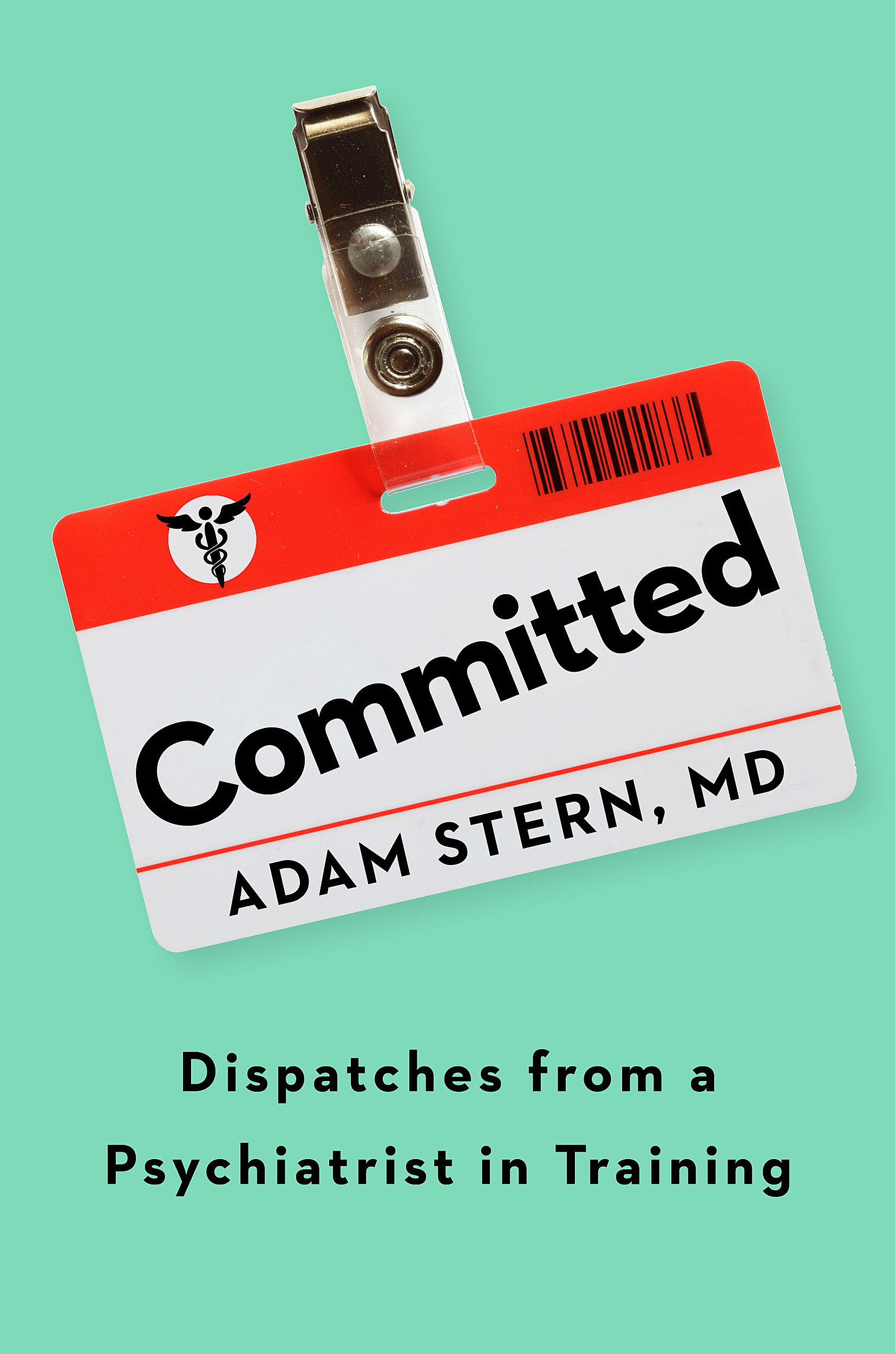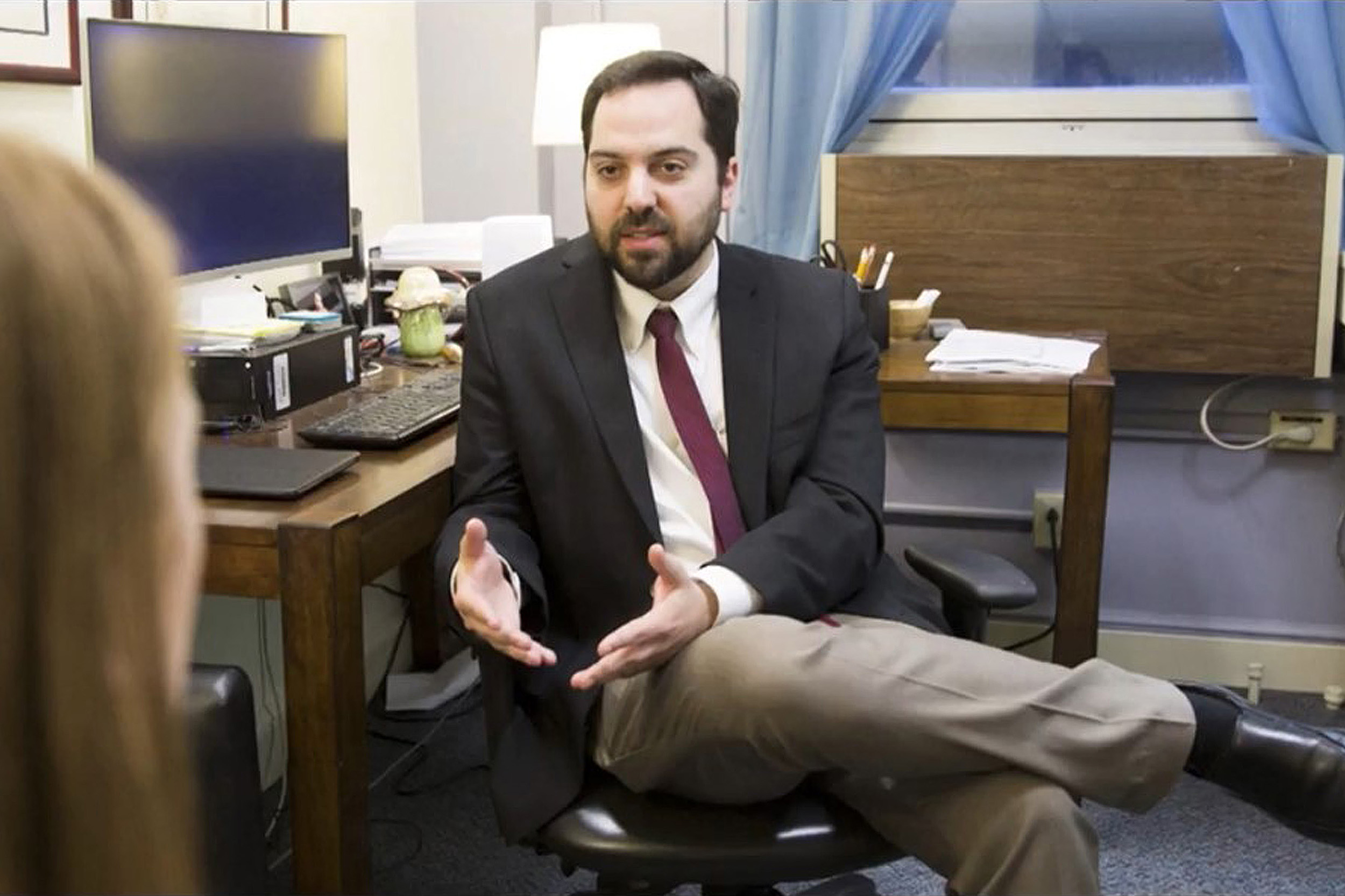Thrown into the deep end in the psych ward
Excerpt from memoir chronicles an intern’s day in the ER

Excerpted from “Committed: Dispatches from a Psychiatrist in Training” by Adam Stern, director of psychiatric applications at Beth Israel Deaconess Medical Center’s Berenson-Allen Center for Noninvasive Brain Stimulation and an assistant professor of psychiatry at Harvard Medical School.
I stopped for two croissants and two coffees in the lobby coffee shop on my way to the ER. I typed in the five-digit code to get into “the bunker,” a tiny room with no windows that the psychiatry staff holed up in to get work done when near the emergency room. There I found the senior resident, Rebecca, staring blankly at the whiteboard that listed the patients waiting to be seen.
“Breakfast?” I asked.
“You stopped for coffee? There’s no time for coffee. Look at this. Look.”
There were eight patients waiting to be seen.
“I don’t understand how they can have a whole team of residents and attendings during the day and leave one second-year resident to carry the load all night.”
“Well, and an intern,” I added.
She shot me a look.
“Right. And you. Well, we better divide and conquer. You take these four, and don’t send anyone home without first presenting the case to me. Understood?”
“Aye-aye.”
But she was already out the door with her clipboard. I sighed and took a slug of my coffee, looking up at the names of the four patients Rebecca had assigned me.
“What the [expletive]?” I asked.
It was practically my whole patient list from the month before. Jane, Paul, Ginger, and Deborah were all back in the ER within a matter of weeks.
“Impossible.”
“What’s impossible?” a woman from the other side of the room asked without looking up from her computer.
“Oh, nothing. I’m just surprised to see some of these names.”
I turned my gaze from the board to the woman.
“You’ve been sitting there this whole time?”
She nodded.
“Who are you?”
“I’m Nancy, the bed finder. I find all these patients beds either here or around the city when they’re admitted. You’re going to want to be nice to me because I’m the only way these patients get out of your ER.”
“Good to know, Nancy. Want a croissant and a coffee?”
“Well, thank you very much,” she said, sticking out her hand, still not looking away from her screen. “So what’s impossible?”
“It’s just, this list of patients I’ve been assigned, they’re — they’re all the patients I was taking care of up on 4 South.”
“So what?”
“Well, they were doing well when I discharged them. I guess I’m just surprised to see them back here.”
“Kid, they always bounce back.”
I took a bite of my croissant and headed out with a clipboard I found next to the printer.
Jane, who had managed to avoid court-mandated treatment for anorexia, was the first patient on my list and the first room I came across on my way through the Green Zone. She was 21 and had an intellect and work ethic that had gotten her into Harvard but was devastated by her anorexia.
Like all of the patients in this part of the emergency department, she was being held behind glass sliding doors in a barren room with only a gurney inside. Her mother sat next to her with puffy eyes staring at the floor.
“Jane,” I announced as I entered.
Impossibly, she looked even thinner and more frail than when she had left. And at that point she weighed 78 pounds.
“Oh good, it’s you.”
“It’s me.”
Our eyes met as we took each other’s measure.
“What brings you into the emergency department today?” I asked, knowing exactly what the answer was.
“Are you an idiot? Do you need me to tell you everything all over again?”
“I find it’s just good to let my patients tell me what’s going on.”
“I’m not your patient. I’m just seeing you because you’re the only idiot here.”
“Okay, Jane. So, help an idiot out, will you? Up on 4 South, you told me how it was all going to go, and you were right. What about now?”
“Times have changed. This time Medicine and Psychiatry are going to have a pissing contest over whether I’m stable enough to be admitted to Psychiatry. Medicine’s going to say I am fine to be admitted to 4 South, and Psychiatry’s going to say my body-mass index is too low, along with my heart rate and glucose.”
“Who’s going to win?”
“Psychiatry, of course. They never take anyone that makes them nervous medically, and I make people nervous.”
“Okay, Jane. Thanks for showing me the way. Anything else I should know?”
This time I made eye contact with her mother, who just shook her head.
“Your shoes are untied.”
I looked down. Right again, Jane. I bent down to tie them and looked back up at her.
“I’ll let you get some rest, but give a shout if I can do anything for you.”
“Let me get some rest?”
She was adept at calling out nonsense.
“You know what I mean,” I said, exiting and closing the sliding glass door.
Adam Stern’s “Committed” tells the story of a day in the life at an ER psych ward.
Photo courtesy of BIDMC

Next up was Paul, a devastated Romeo whose girlfriend had moved to Sweden. When I entered Paul’s room, he told me he was suicidal again. I asked if he was still heartbroken, and he said he was.
“It’s incredibly hard when someone you care about moves away,” I said.
“She didn’t move away this time.”
“This time?”
“There’s someone new. Well, there was. She dumped me, though.”
Paul had apparently rebounded hard after his discharge from 4 South, and I was beginning to scan through the Diagnostic and Statistical Manual’s list of personality disorders in my mind. He didn’t quite fit with borderline personality or narcissistic personality, but one could make an argument for dependent personality in someone who repeatedly falls so hard and fast that they become suicidal when it doesn’t work out.
I asked him about his suicide plans, and he listed off seven or eight potential methods of ending his own life. With that, I knew that Paul had just qualified for another inpatient stay or at the very least that I could not discharge him. Rebecca had taught me early on that ER psychiatry is a different kind of animal from all the other environments we rotate through.
“The key is that every encounter ultimately boils down to will you admit the patient or will you discharge them,” Rebecca said. “You can’t do therapy in the ER. You can’t give medicine that will make much of a difference. All you can do is decide where the next treatment is going to happen.”
“What about a therapeutic encounter? Empathic listening? Can’t you make a difference that way?” I asked.
“Oh, yeah. Of course that. If you have time,” she replied without any hint of irony or sarcasm.
Next, I saw Deborah, a 54-year-old woman with a history of 14 admissions due to bipolar disorder. She had been looking really well by the time she was last discharged after an acute manic episode on 4 South.
Her room was dark, with the curtains drawn in front of the glass.
“Deborah? It’s Dr. Stern. May I come in?”
I heard a muffled response and poked my head in. Her face was buried in the pillow. I sat down next to the bed and waited for her to engage, but she didn’t.
“Deborah, can we talk?”
Slowly, she turned her face to look at me.
“I can’t live like this. I’m taking the medicine, and it’s just making me more depressed every day. Why is this happening?”
She looked to me for guidance, but all I had was empathy.
“I’m sorry this is happening to you. It’s the disease.”
“What am I going to do?” she asked desperately.
“We’re going to take care of you,” I replied.
There were mounds of paperwork beginning to pile up for each of the three patients I had seen, but I was determined to see the last of the four I had been assigned before returning to the bunker to work on my notes.
The fourth patient was middle-aged Ginger. The first time I’d seen her she was transfixed by a wall mirror, deep in her psychotic thought processes, and she seemed to take comfort in a pocket mirror I gave her.
When I entered the room, though, it occurred to me that all of her possessions including the mirror had been stowed away by security. She was pacing and self-dialoguing in a way that I couldn’t follow. I couldn’t get her to look at me or even say hello.
I stepped out of the room and asked around until I was able to find another small pocket mirror. I held it out in my hand, which caused Ginger to stop pacing and look up at me for the first time. She reached out and gently took the mirror from me.
She looked at herself in it, and I saw her face tighten and her lips curl down. She threw it down onto the tiled floor, and it cracked. Then she looked up at me, her face still in a grimace, and began to pace again.
“I’m sorry you’re having a difficult time,” I said as I scooped up the broken mirror.
I stepped out of the room and told the nurse on duty I’d be ordering antipsychotics for her momentarily.
When I got back to the bunker, Rebecca seemed even more frazzled than she had at the beginning of the shift.
“Nobody’s doing very well, I’m afraid,” I said by way of report.
“Write the notes and move on,” she replied. “Four new consults have already come in.”
Author’s note: This book is based on my experiences during psychiatry residency training. When possible, I have obtained permission from — and I have also changed names and identifying characteristics of — many of the people represented to protect their privacy. I’ve also created composite characters. Patient descriptions and patient encounters in this book have been deliberately altered to make them unidentifiable.
Copyright © 2021 by Adam Stern, MD. Reprinted by permission of HarperCollins Publishers. Available now from HMH Books & Media.



